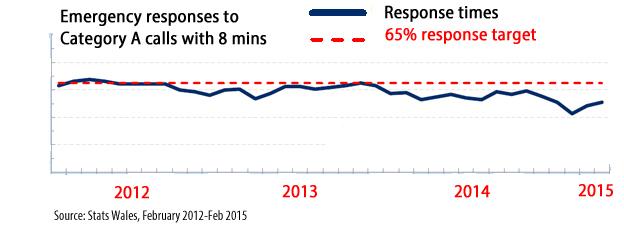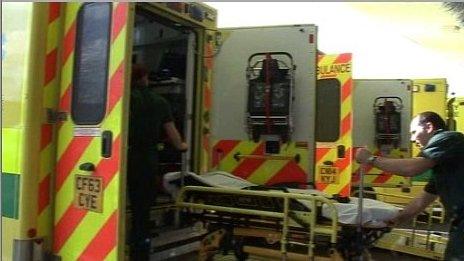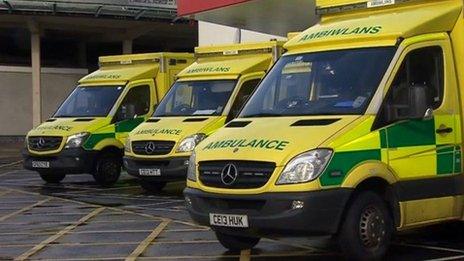Welsh ambulance progress 'not fast enough'
- Published
A 10-page letter has been sent to deputy minister Vaughan Gething by the committee's chairman
The ambulance service in Wales is not improving quickly enough, a cross-party committee of AMs has warned.
It praises the "strong leadership" of the service's new chief executive, with a turnaround in emergency response times for two months in a row.
But a letter to the deputy health minister urges progress in eight areas.
The ambulance service said it was committed to building on "the considerable good work that is already under way".
The committee held an inquiry into the ambulance service, which has only hit the target figure for responding to emergency calls once in two and a half years.

This shows the response times against target for the last three years
The Welsh government target is for 65% of ambulances to respond to emergency calls within eight minutes.
In February crews hit the target 51.2% of the time but last December's figures - just 42.6% - were the worst on record.
New chief executive Tracy Myhill said the latest figures were encouraging and she hoped ongoing improvement initiatives would start to bear fruit in the coming months.
Health and social care committee chairman David Rees said he acknowledged her leadership and the practical actions taken "to bring about cultural change and drive up performance".
But he insisted there needed to be "rapid and sustained improvement".
"Despite this, the committee is not yet persuaded that performance is improving quickly enough."
The committee's 10-page letter to Vaughan Gething sets out areas where progress was needed:
Address issue of ambulances being 'pulled away' from their areas
Work to cut patient handover delays at A&E
Look at community treatment alternatives in light of a big rise in 'elderly frequent callers'
Ambulance service must be involved early in any hospital service changes
A review of the way response times are measured must not divert focus from improving responses 'urgently'
Ensure response times in the future can keep pace with changes in demand and population
Inconsistencies in staff rosters and how they impact on demand to be addressed
Emergency service must be prioritised

Analysis - BBC Wales health correspondent Owain Clarke
After summoning health bosses to explain what has been going wrong, the assembly's health and social care committee, perhaps unsurprisingly, has called for several improvements.
The committee wants ambulance bosses to make sure that enough staff are available in the right places to deal with "spikes" in demand.
Assembly members also want changes made to prevent ambulances from being "pulled away" from remote areas resulting in "clustering" around emergency departments.
A pilot project is currently underway in the Cwm Taf health board area where no vehicles are dispatched to calls outside of the Cwm Taf boundary, except for highest-priority Red 1 calls and major incidents.
The chair of the committee David Rees has told BBC Wales that if the pilot is successful in improving response times similar programmes should be adopted across Wales.
The committee has acknowledged recent progress in improving staff morale and building relationships with the unions.

Mr Rees added: "Individually, frontline ambulance service staff fulfil challenging roles to high standards and provide help and support to people in times of need, but overall the ambulance service's response time performance is not where it should be."
Mick Giannasi, chairman of the Welsh Ambulance Service Trust, said they were pleased the hard work of ambulance staff had been acknowledged.
"What is important now is that we continue to drive our change agenda with pace and energy and retain our focus on doing the right thing for patients by providing high quality emergency unscheduled care in a timely way," he added.
The Welsh government said Mr Gething would respond to the letter "in due course".
- Published25 March 2015

- Published25 February 2015
